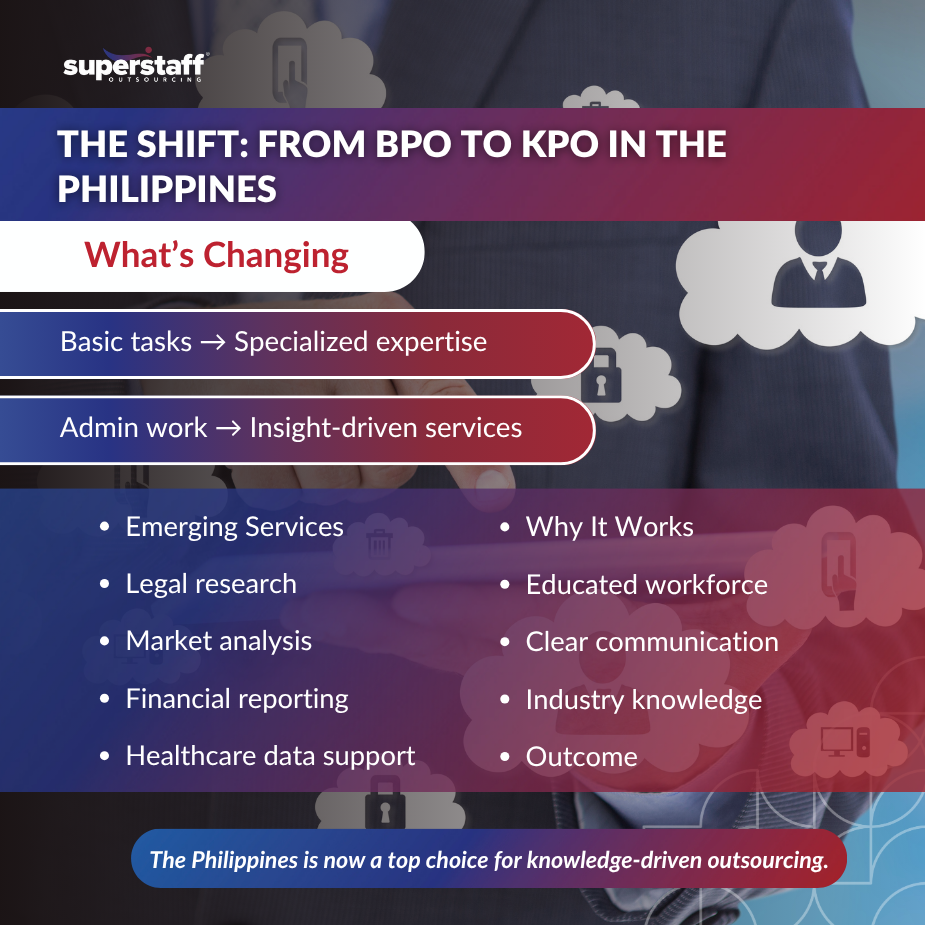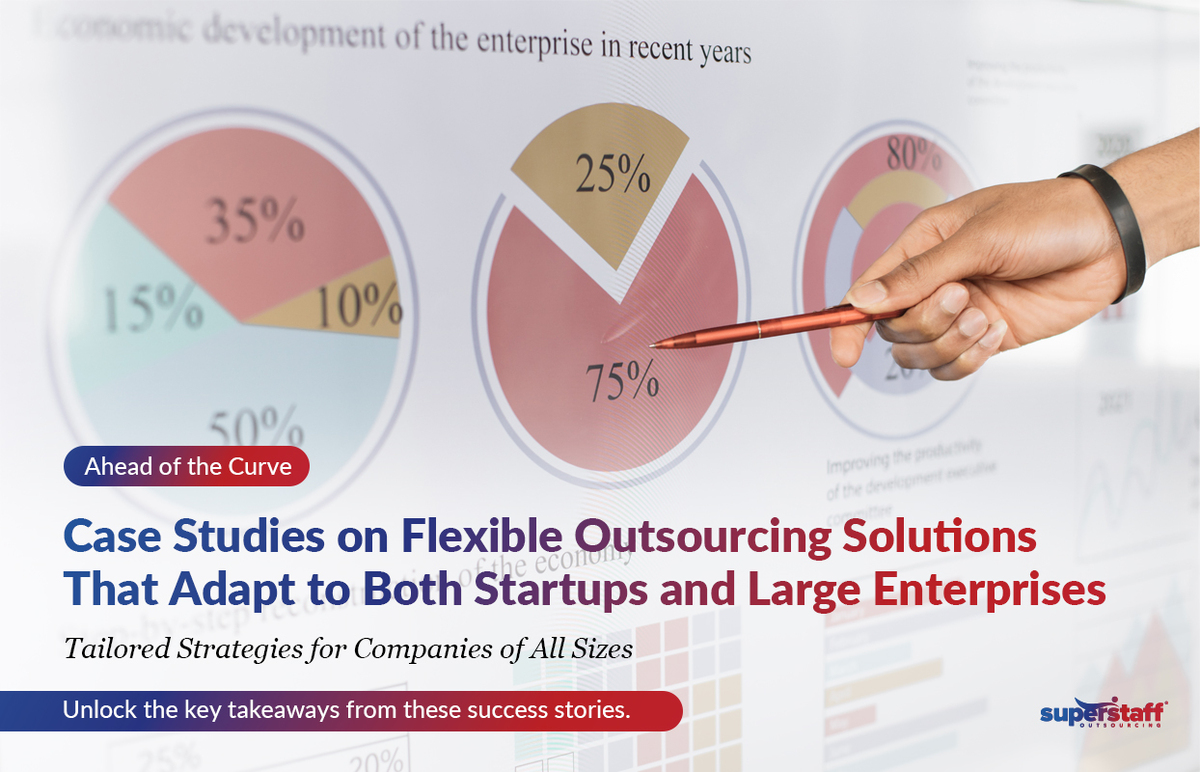
Business process outsourcing (BPO) has long been a strong industry in the Philippines, supporting global clients through customer service, data entry, and administrative work. But client needs are changing. Instead of only asking for help with routine tasks, many companies now need support that requires deeper expertise.
This shift has led to the rise of knowledge process outsourcing in the Philippines. Global businesses are looking for teams that can handle research, analytics, legal services, and financial tasks. As a result, local BPO firms are expanding their service offerings to match these needs.

What Makes Knowledge Process Outsourcing Different?
Traditional BPO work focuses on repetitive tasks. KPO, on the other hand, involves roles that require analysis, decision-making, and specialized knowledge. This includes fields like finance, law, engineering, healthcare, and market research.
Here’s how they compare:
- BPO Tasks: Customer support, data encoding, email management, scheduling
- KPO Tasks: Financial modeling, legal case review, technical content creation, research reports
As global businesses continue to face tight competition, they need outsourcing partners who can offer insights and knowledge—not just operational support. This is why many are turning to knowledge process outsourcing in the Philippines.
What’s Driving the Demand for KPO Services?
Several factors are pushing companies to seek higher-value services from their outsourcing partners:
1. Demand for Specialized Talent
Businesses want access to people who understand complex subjects. For example, healthcare companies need support from nurses or pharmacists for medical transcription. Law firms need help from legal researchers.
2. Pressure to Do More with Less
Instead of building large in-house teams, companies are outsourcing specialized tasks to reduce costs while maintaining quality.
3. Need for Faster Decision-Making
With access to skilled professionals, businesses can get the data and reports they need to make informed decisions.
This shift in demand explains how BPO firms in the Philippines are expanding into KPO to meet new client expectations.
How BPO Firms in the Philippines Are Expanding into KPO
To stay competitive, BPO firms are upgrading their services and teams. The goal is to move from general support to expert-level tasks.
1. Upskilling Employees
Many firms are training their workforce in areas like data analytics, financial services, and legal research. This helps them match global client needs.
2. Hiring Licensed Experts
Companies are now recruiting professionals such as certified accountants, registered nurses, engineers, and lawyers. These teams can handle tasks that go beyond standard back-office work.
3. Expanding Service Lines
BPO firms are no longer limited to basic tasks. Here are some KPO services in the Philippines that are becoming more common:
- Investment and equity research
- Legal document review
- Medical billing and clinical data analysis
- Engineering drawing and design support
- Market trend analysis
- Technical writing and documentation
By offering these services, BPO firms are positioning themselves as full-service partners.
Why the Philippines Stands Out for KPO
Many countries offer outsourcing services. But the Philippines has specific strengths that make it ideal for knowledge process outsourcing.
1. Language and Communication
English is widely spoken in the Philippines. Strong writing and speaking skills are especially important in KPO tasks such as legal documentation, business reports, and research papers.
2. Educated Talent Pool
Every year, thousands of graduates enter the workforce with degrees in business, IT, law, healthcare, and engineering. These graduates form the backbone of knowledge process outsourcing in the Philippines.
3. Cultural Compatibility
Clients from the U.S., Canada, and Australia find it easy to work with Filipino teams due to shared work habits and familiarity with Western business standards.
4. Competitive Cost
Despite offering skilled services, labor costs in the Philippines remain affordable. This gives businesses access to expert talent without the high costs of hiring in-house teams.
5. Government Support
The Philippine government continues to support outsourcing growth through training programs, infrastructure upgrades, and tax incentives. This ensures that the country remains a strong KPO hub for years to come.
Popular Knowledge Process Outsourcing Services
Startups, mid-size firms, and large enterprises are all tapping into KPO services in the Philippines. Here are examples of commonly outsourced roles:
- Financial Services
- Bookkeeping
- Financial forecasting
- Investment research
- Legal Process Outsourcing (LPO)
- Contract management
- Legal transcription
- Document review
- Healthcare KPO
- Medical coding
- Clinical data analysis
- Claims review
- Technical and Creative Services
- Content writing
- Data visualization
- UI/UX research
- Engineering and Architecture
- Drafting support
- Structural calculations
- CAD documentation
These services allow clients to grow quickly without building large internal departments.
Benefits of Knowledge Process Outsourcing in the Philippines
For companies that need more than just back-office support, the Philippines offers clear business value:
- Scalability – Easily grow your team without long hiring timelines
- Access to Experts – Work with professionals trained in your industry
- Cost Efficiency – Get high-value work done at a lower cost
- Faster Turnaround – Reduce delays in reporting and analysis
- Better Focus – Let your internal teams focus on core strategy
These benefits show why more businesses are exploring knowledge process outsourcing in the Philippines.
What This Means for the Future of Outsourcing
As BPO evolves into KPO, the outsourcing industry in the Philippines is maturing. This transformation is helping local providers build stronger relationships with clients through long-term, strategic work.
Companies are no longer just buying support; they are investing in knowledge. This shift creates better jobs for Filipino workers and more value for businesses around the world.
How SuperStaff Supports Clients with Knowledge-Based Services
SuperStaff is ready to support your transition from traditional outsourcing to more advanced services. We offer flexible solutions that fit your industry and your growth stage.
Our teams in the Philippines include professionals in finance, healthcare, legal support, and research. Whether you need ongoing support or help with a specific project, we can build a team that fits your goals.
We also help startups and scaling businesses develop lean, expert teams who can handle knowledge-driven work.
Scale Smarter with Knowledge Process Outsourcing
If your business needs expert-level support that goes beyond routine tasks, outsourcing is still a smart move. But the approach is changing.
Knowledge process outsourcing in the Philippines gives you the advantage of skilled professionals, strong communication, and flexible solutions, all at a lower cost than hiring in-house.
SuperStaff offers scalable, knowledge-based services to help you move forward with confidence. Whether you’re building a new department or need extra support for research or analytics, our Philippine-based talent is here to help.






